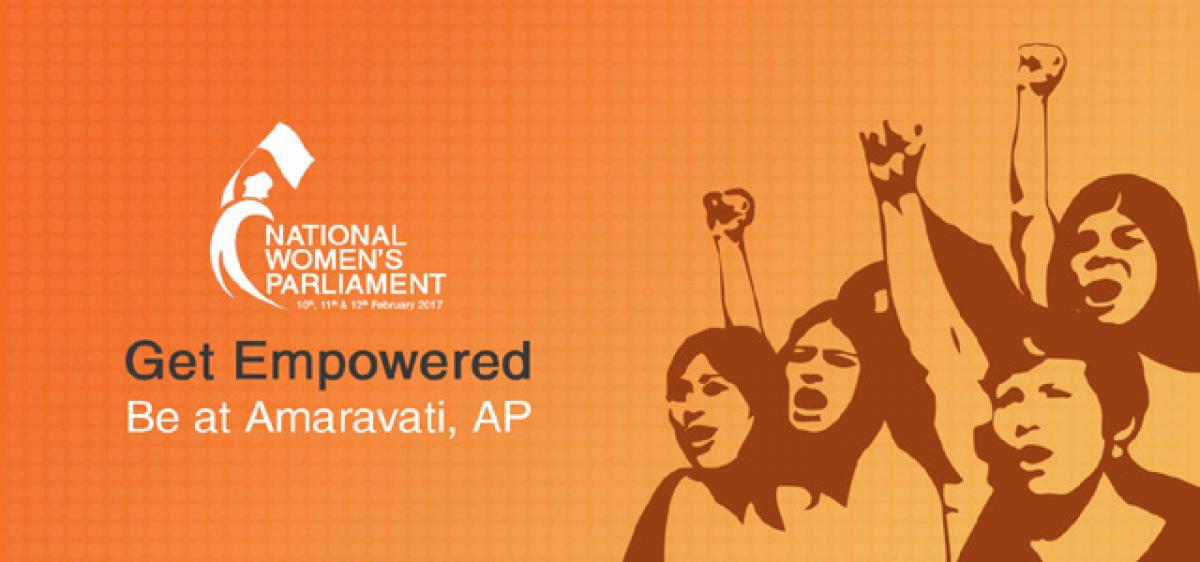Live
- BJP urges EC to stop Cong’s ‘Guarantee Cards’ campaign aimed to 'induce voters'
- Congress cheated Madigas: Dr. RS Praveen Kumar
- CBDT signs record 125 pacts to ease tax payments by big multinational firms
- Kamal Nath accuses BJP of ‘threatening’ Congress leaders in Chhindwara
- Odisha: BJP, BJD allege violation of MCC
- PM Modi lands in Guwahati to kickstart poll campaign
- ‘100 day action plan’ is PM Modi’s signature style for setting goals and meeting targets
- BJP will change the Constitution if they come to power again, says Priyanka Gandhi
- BJP-led NDA to cross 390-mark in Lok Sabha polls, predicts India TV-CNX survey
- Haier launches new TV series in four sizes in India
Just In
National Women Parliament: Inanity of political parties comes to fore


It is perhaps the time the adage, there is every woman behind every man’s success, needs to be re-scripted in a reverse direction in a gender-friendly format — There is every man behind every women’s success.
It is perhaps the time the adage, there is every woman behind every man’s success, needs to be re-scripted in a reverse direction in a gender-friendly format — There is every man behind every women’s success.
Exactly, that is what the three-day National Women Parliament (NWP) has sent out the message. The AP Assembly Speaker, Kodela Sivaprasada Rao, took the initiative and convened the session as a state function last week.
Right from spiritual leader Dalai Lama, it was men such as Chief Minister N Chandrababu Naidu and Union Minister for Urban Development M Venkaiah Naidu who outnumber women on the dais all through.
Pavitra Sanghamam, a place on the banks of the Krishna river near Ibrahimpatnam in AP’s capital Amaravati, as it is literally meant, has become a confluence of scores of women from far and wide by hosting the three-day woman congress.
It could draw the women who matter even from overseas such as Bangladesh and Sri Lanka. The participants included leaders representing the polity, civil society, professionals and college students.
With the confluence (Sanghamam) of the Godavari with the Krishna and Amaravati, abode of Amaralingeswara Swamy temple on the other side of the Krishna in the backdrop, the venue – Pavitra Sangamam – provided a perfect setting for the national event to kick-start a brainstorming session on issues concerning women from all walks of life.
Of all, it is the need for a fair share in political space that dominated the deliberations. The fate of a bill seeking 33 per cent quota for women in the Parliament and the state legislative councils that keeps hanging in balance for more than two decades for want of `consensus’ from the male dominated Parliament that hogs the limelight.
But the women parliament conspicuously ended up without an action plan to finish the unfinished task nor did it see preparedness on the part of the very stakeholders to take it to its logical end.
This could be evident in an animated conversation between CM Naidu and Lok Sabha Speaker Sumitra Mahajan. When Naidu at the wrap-up session offered to mobilise political opinion in favour of the women quota and asked Mahajan to take the lead in accomplishing the task, the Speaker simply shot back, “Quota for women is not something like a dole handed out by someone. It should come automatically.”
Women celebrities with political and films background dominated the show. Among them were Bramhani, CM’s daughter-in-law, Kavitha, TRS MP and Telangana CM K Chandrasekhar Rao’s daughter, Sailaja Kiran, a corporate honcho from the Ramoji group of companies, and a few film stars.
This celebrity show brings to the fore the question whether a handful of women from rich and aristocratic families do represent the country’s half the women population and their rise and fall in their day to day life.
Meanwhile, the women’s conference also presented the flipside of the talk of women empowerment that takes place in the corridors of power. The episodes of V Padmapriya, a BTech graduate from Visakhapatnam and the estranged daughter-in-law of the Assembly Speaker, and YSRC MLA Roja exposed the real faces of some of the so-called “men behind the women’s success.”
Padmapriya’s video clips depicting how she was subjected to intimidation, kidnap, attack and separation from her 4-year-old child by her husband with the backing of the Speaker went viral during the women congress.
Roja, although invited, was whisked away in a police van immediately after her landing at the Gannavaram airport and disallowed into the meeting venue.
The Speaker, in the run-up to the high-profile women event, landed in a major controversy with his off-the-cuff remark, drawing parallel between the cars parked in sheds and women in the kitchen.
He became the butt of the ridicule and criticism by the national media and women activists, portraying him as a `sexist’ in a women-friendly mask. The plight of Padmapriya sums up the woes of average women. But the NWP was criticised for failing to mirror the tell-tale stories of women on the street, at workplaces and in colleges.
The story of Padmapriya also exposed the pep talk of political parties, both in opposition and in ruling, and their women outfits on gender justice and women rights for their failure to take up her cause.

© 2024 Hyderabad Media House Limited/The Hans India. All rights reserved. Powered by hocalwire.com






